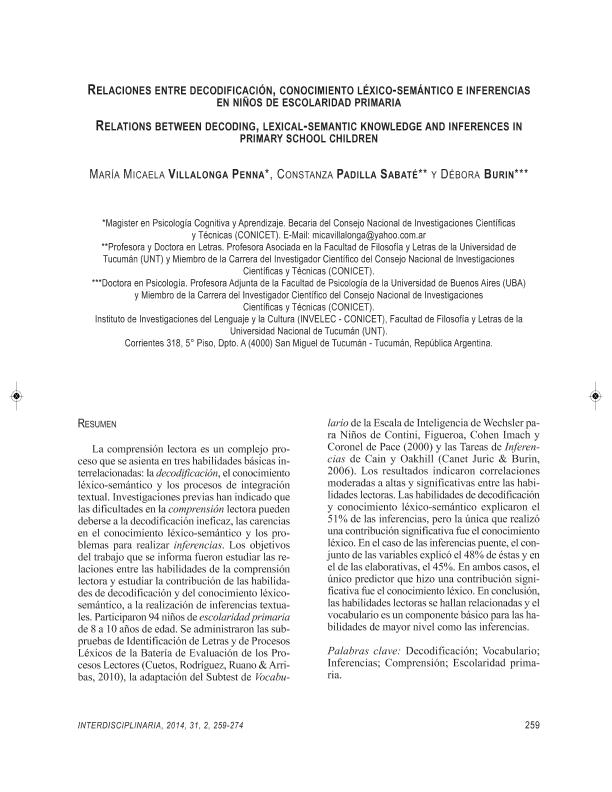Artículo
La comprensión lectora es un complejo proceso que se asienta en tres habilidades básicas interrelacionadas: la decodificación, el conocimiento léxico-semántico y los procesos de integración textual. Investigaciones del ámbito angloparlante y nacional han indicado que las dificultades en la comprensión lectora pueden deberse a la decodificación ineficaz, las carencias en el conocimiento léxico-semántico y los problemas para realizar inferencias. Los objetivos de este trabajo son: 1) estudiar las relaciones entre las habilidades de la comprensión lectora; 2) estudiar la contribución de las habilidades de decodificación y del conocimiento léxico-semántico, a la realización de inferencias textuales. Participaron (N=94) niños de 8-10 años de escolaridad primaria. Se administraron pruebas de la Batería de Evaluación de los Procesos Lectores (decodificación), Vocabulario de la Escala de Inteligencia de Wechsler para Niños y las tareas de Inferencias de Cain y Oakhill. Los resultados evidenciaron correlaciones moderadas a altas y significativas entre las habilidades lectoras. Las habilidades de decodificación y conocimiento léxico-semántico explicaron el 51% de las inferencias, pero la única que realizó una contribución significativa fue el conocimiento léxico. En el caso de las inferencias puente, el conjunto de las variables explicó el 48% de éstas y, en el de las elaborativas, el 45%. En ambos casos, el único predictor que hizo una contribución significativa fue también el conocimiento léxico. En conclusión, las habilidades lectoras se hallan relacionadas, y el vocabulario es un componente básico para las habilidades de mayor nivel como las inferencias. Reading comprehension is a complex process which lies upon three interrelated basic skills: decoding, lexical semantic knowledge and word to-text integration processes. Decoding entails the reader's ability to recognize grapheme-phoneme correspondence. Lexical semantic knowledge refers to the knowledge of words in a given language, and it includes both word identification, i.e., visual processing of the graphemes' shapes and lexical activation; and semantic awareness, i.e., knowledge of meaning. Decoding and lexical semantic knowledge are deemed as pertaining to a lower level in relation to integration, in which category we include such skills as inference - generation. Previous research, notably in England, the United States of America and Argentina, has shown that difficulties in reading comprehension may be due to faulty decoding, poor lexical semantic knowledge and inference making failures. Although each of these skills is necessary to achieve comprehension, none of them alone can guarantee it. It is considered that decoding and lexical knowledge are associated skills, and influence each other. The effects of decoding in text comprehension are mediated by knowledge about the meaning of words and the effects of comprehension in decoding depend on the achievement of sufficient word meanings. Thus, the aims of this paper were to study the relations among reading comprehension skills and to study how decoding skills and lexical semantic knowledge contribute to inference-making generation. In broad terms, the hypotheses were reading comprehension skills are interrelated and decoding skills and lexical knowledge are significant predictors of inference-making generation. This survey was conducted among 94 primary school children of an average age of 8 to 10 years old. They were given the Letter Recognition and Lexical Processes Tests from the PROLEC Test Battery, the Vocabulary Subtest from Wechsler Intelligence Scale for Children (WISC-III) and the Inference-making Ability Assessments from Cain and Oakhill (Canet Juric & Burin, 2006). Results have shown that in the decoding assessment, the highest number of errors and correct answers are found in pseudo word reading. Regarding lexical knowledge, the highest average of right answers is found in word reading. As regards word-to-text integration, the average number of inferences incorrectly drawn is 14.62. Since the tests we used measured right and wrong answers, indices of decoding and lexical knowledge were created. Moreover, our findings suggest significant and moderate-to-strong relations among reading comprehension skills. Decoding skills and lexical semantic knowledge have accounted for 51% of inferences. However, lexical knowledge alone has made the most significant contribution. The set of variables has accounted for 48% of coherence inferences and 45% of elaborative inferences. The only significant predictor of both types of inference-making was lexical knowledge. To conclude, as posited by international research and our first hypothesis, comprehension skills are interrelated. Taking into consideration our second hypothesis, our findings suggest that comprehension skills account for inference-making generation and that lexical knowledge reveals itself as a predictor of the children's potential ability for inference-making. In other words, vocabulary is a basic component of more complex skills such as inference. This is consistent with what international research suggests. As regards the performance of the general sample in the assessed comprehension skills, it resembles that of the child population of the same age, surveyed in Tucumán and in. Taking into consideration the way in which comprehension skills relate to and affect each other could allow us to develop intervention programs which would help improve the performance of children who demonstrate text comprehension difficulties.
Relaciones entre decodificación, conocimiento léxico-semántico e inferencias en niños de escolaridad primaria
Título:
Relations between decoding, lexical-semantic knowledge and inferences in primary school children
Fecha de publicación:
12/2014
Editorial:
Centro Interamericano de Investigaciones Psicológicas y Ciencias Afines
Revista:
Interdisciplinaria
ISSN:
0325-8203
e-ISSN:
1668-7027
Idioma:
Español
Tipo de recurso:
Artículo publicado
Clasificación temática:
Resumen
Palabras clave:
DECODIFICACIÓN
,
VOCABULARIO
,
INFERENCIAS
,
COMPRENSIÓN
,
ESCOLARIDAD PRIMARIA
Archivos asociados
Licencia
Identificadores
Colecciones
Articulos(INVELEC)
Articulos de INSTITUTO DE INVESTIGACIONES SOBRE EL LENGUAJE Y LA CULTURA
Articulos de INSTITUTO DE INVESTIGACIONES SOBRE EL LENGUAJE Y LA CULTURA
Articulos(SEDE CENTRAL)
Articulos de SEDE CENTRAL
Articulos de SEDE CENTRAL
Citación
Villalonga Penna, María Micaela; Padilla Sabate, Constanza; Burin, Debora Ines; Relaciones entre decodificación, conocimiento léxico-semántico e inferencias en niños de escolaridad primaria; Centro Interamericano de Investigaciones Psicológicas y Ciencias Afines; Interdisciplinaria; 31; 2; 12-2014; 259-274
Compartir




